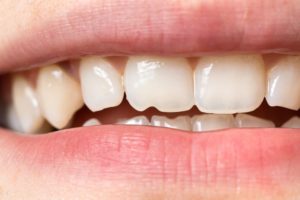Have you noticed that your teeth are looking translucent, especially at the ends? You might feel self-conscious about this change in your smile’s appearance. But this type of damage implies structural dental problems too.
An evaluation from your dentist can help determine the extent of this damage as well as a treatment plan to get your smile back to looking and feeling its best. Read on to learn more about this cosmetic change to your teeth and what it means for your oral health.

What Causes a Translucent Appearance in Teeth?
If your teeth begin to appear translucent, this could be a symptom of enamel erosion. The outer layer of your teeth, enamel, is durable, but it may begin to wear down due to poor oral habits or factors beyond your control, like aging. This will expose the interior of your tooth, which could cause uncomfortable conditions like tooth sensitivity.
Once enamel is gone, it will not regrow. This can leave you with aesthetic concerns such as the see-through effect at the edge of your teeth. It may also put your smile at risk of dental problems, such as cavities. If you notice this issue in your teeth, you should contact your dentist for an evaluation.
Can My Dentist Restore Eroded Tooth Enamel?
Natural enamel cannot be restored once it weakens or thins. However, your dentist can provide treatments to resolve symptoms occurring because of enamel loss as well as preventative measures to protect your smile.
If you hope to improve the appearance of your teeth when they become translucent, your dentist can offer cosmetic dental solutions. Tooth bonding will employ composite resin to cover this aesthetic concern and make your smile appear brighter and more whole.
Patients with more structural damage and risk in the event of enamel erosion may need restorative dental intervention. This could entail replacing the enamel with a dental crown.
The ceramic cap will cover a tooth, acting as a shield to protect the inner layers of the tooth. This will alleviate tooth sensitivity pain and protect the tooth from further harm. The crown seals into place with dental cement, allowing it to remain for fifteen or more years with proper care.
Can I Prevent Enamel Erosion?
Though you cannot reverse damage to your tooth enamel, you can take measures to avoid further deterioration of your teeth. You can provide good protection for your smile by removing plaque and other harmful residues from your teeth promptly. The way you can do this is through proper oral hygiene habits.
An effective oral hygiene routine will include brushing your teeth twice a day, flossing daily, and visiting your dentist regularly for teeth cleanings. You can also rinse with a mouthwash that contains fluoride. Fluoride strengthens tooth enamel, making it better able to resist external threats that could cause it to erode. Ask your dentist for more tips for preserving your tooth enamel.

